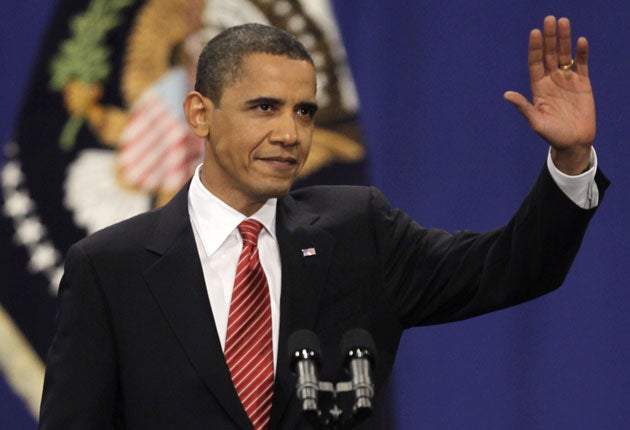Obama's pledge: they'll be home in three years
Strict conditions attached as President dispatches more troops to Afghanistan

President Barack Obama last night unveiled his “endgame” strategy for the war in Afghanistan with a pledge to deploy an additional 30,000 US troops “at the fastest pace possible” with the goal of starting the process of withdrawal as soon as July 2011 – just eighteen months away.
The speech, delivered to cadets at the West Point Military Academy in New York and televised live to the nation, marked an end to months of anguished debate inside the White House against a background of dwindling support for the war throughout the US and Europe. It is arguably America's last chance to reset the clock and get things right with the war in Afghanistan - for so long the step-sister to the military effort in Iraq.
The President directly confronted critics, many in his own party, who continue to claim that by expanding the war effort, Mr Obama is indeed leading the country into a new Vietnam dead end. That, he said, amounted to "a false reading of history." He said that unlike Vietnam, the US has been joined by a coalition of 43 nations in Afghanistan and is not facing a broad-based popular insurgency. He said that in this case, moreover, "the American people were viciously attacked from Afghanistan, and remain a target" for al-Qa'ida extremists.
"The 30,000 additional troops that I am announcing tonight will deploy in the first part of 2010 - at the fastest pace possible - so that they can target the insurgency and secure key population centres,” the President said.
The President's plan will also attract some scepticism regarding his determination first to surge troop levels and then begin bringing them home within such a short time frame. "After 18 months, our troops will begin to come home," he said flatly.
Republican criticism was swift. "The way that you win wars is to break the enemy's will, not to announce dates that you are leaving," said Senator John McCain, the top Republican on the Senate Armed Services Committee and Obama's campaign rival in last year's presidential race.
Mr Obama was also at pains to insist that the US will not be acting alone.
“I have asked that our commitment be joined by contributions from our allies,” he declared. “Some have already provided additional troops, and we are confident that there will be further contributions in the days and weeks ahead.” Sources in Brussels said Mr Obama is seeking an additional 10,000 personnel from the European allies, though many would go as trainers to Afghan forces.
The combined surge, “will allow us to accelerate handing over responsibility to Afghan forces, and allow us to begin the transfer of our forces out of Afghanistan in July of 2011” while “taking into account conditions on the ground.” But, Mr Obama went on, “it will be clear to the Afghan government - and, more importantly, to the Afghan people - that they will ultimately be responsible for their own country.” He also insisted that America had no imperialistic motivations in remaining in their land. "I want the Afghan people to understand – America seeks an end to this era of war and suffering. We have no interest in occupying your country."
Mr Obama is expected to set conditions on the Afghan government and President Hamid Karzai, with whom he spoke by video conference phone. The speech also lingered on the importance of Pakistan working to stabilise the tribal regions close to the border where Taliban and al-Qa’ida leaders have found safe haven.
While the troop-level decision had been widely anticipated, the speed of the planned deployment and subsequent process of withdrawal as well as some of the conditions attached will catch some by surprise. Sources said the intent was to have all new US troops in place by July next year.
Among the many tasks that faced Mr Obama last night was reminding the American public of the reasons behind the war. “What’s at stake is the security of our Allies, and the common security of the world,” he argued, underscoring the dangers of allowing Afghanistan to fall back into the hands of the Taliban.
After conferring with Mr Karzai, Mr Obama also held consultations with Pakistan’s president, Asif Ali Zardari, offering additional support for his military if it steps up operations in its border areas. In recent days, he has also spoken to the leaders of key nations including Britain, Russia and France about his decisions.
The new commitment means the US will have doubled troop numbers in Afghanistan since Mr Obama took office, with 21,000 new US soldiers deployed last spring. It also means that the total Nato presence in the country – if European leaders are able to deliver the new numbers Mr Obama is asking for – will rise to 110,000.
Mr Obama last night described the benchmarks for progress he expects from the Karzai government on removing cronies and warlords from senior positions, taking firm action against corruption, and building up its own security forces. In a plan that threatens to devolve power away from Kabul, the Americans want to turn over control of the country province by province in the next three years. Those provinces deemed to be the most stable and effectively governed would be freed from international interference – and protection – first.
Join our commenting forum
Join thought-provoking conversations, follow other Independent readers and see their replies
Comments